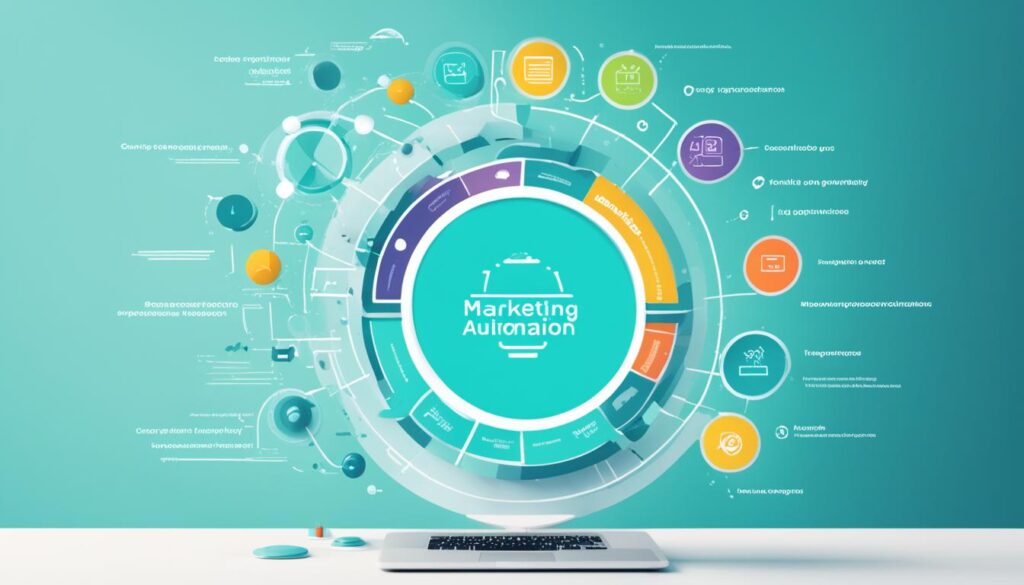This guide will show you how marketing automation can change your business for the better. We’ll cover what marketing automation is, its main benefits, and how to use it well. By the end, you’ll know how to use marketing automation to make your marketing better, engage more with customers, and grow your business.
Key Takeaways
- Marketing automation makes marketing tasks easier and automates the boring stuff, making things more efficient.
- Marketing automation has big benefits like helping with lead nurturing, sending out personalized emails, mapping the customer journey, and making decisions based on data.
- Picking the right marketing automation tool is key. Look for features like campaign management, automating workflows, and working well with CRM systems.
- To use marketing automation well, plan carefully, make sure it fits with your systems, and follow best practices.
- Using marketing automation can help your business get more leads, engage better with customers, and grow overall.
What Is Marketing Automation?
Marketing automation uses software and technology to make marketing tasks easier and more efficient. It lets businesses automate routine tasks, so teams can focus on big projects. This way, companies can do better marketing, get more leads, and connect with customers more effectively.
Streamlining Marketing Processes
Marketing automation helps businesses make their marketing work better and more consistent. It makes sure marketing tasks are done well across different channels. This includes things like getting leads, sending emails, and using social media. Automation tools make these tasks easier and save time.
Automating Repetitive Tasks
Marketing automation is great at handling tasks that need to be done over and over. This includes sending emails, planning social media, scoring leads, and starting campaigns when needed. By doing these tasks automatically, businesses save time, avoid mistakes, and make sure their marketing is always on time and consistent.
| Feature | Benefit |
|---|---|
| Email Marketing Automation | Personalized, triggered email campaigns to nurture leads and engage customers |
| Lead Scoring and Segmentation | Prioritize and personalize outreach based on lead behavior and demographics |
| Social Media Scheduling | Consistent, on-brand social media presence without manual posting |
Using marketing automation, businesses can make their marketing smoother, automate routine tasks, and do better overall.

Benefits of Marketing Automation
Marketing automation brings many benefits to your business. It makes repetitive tasks easier and automates marketing processes. This helps you generate and nurture leads better, engage with customers more, and boost marketing efficiency.
One big plus is it helps generate more qualified leads. With targeted campaigns, you reach the right people at the right time. This increases the chance of making sales. Plus, it keeps potential customers interested, helping them move through the sales process.
Marketing automation also enhances customer engagement. It offers personalized experiences by using customer behavior and preferences. This builds stronger relationships and loyalty, which means more customers stay with you and come back.
Another big advantage is improved marketing efficiency. It automates tasks like sending emails, posting on social media, and sorting leads. This lets your team focus on creative and strategic work. This makes your marketing better and more productive.
| Benefit | Impact |
|---|---|
| Lead Generation | Targeted and personalized campaigns to attract more qualified leads |
| Lead Nurturing | Automated workflows to guide leads through the sales funnel |
| Customer Engagement | Personalized experiences to build stronger customer relationships |
| Marketing Efficiency | Automation of repetitive tasks to free up time for strategic work |
Using marketing automation, businesses can do more, attract more leads, and engage with customers better. This leads to growth and success.

Lead Nurturing with Email Marketing
Email marketing is a key tool in marketing automation for nurturing leads. It lets us send personalized messages to our prospects. This approach builds engagement and moves them closer to making a purchase.
Personalized Email Campaigns
Personalizing our emails is key to effective lead nurturing. Marketing automation helps us segment our audience by their needs and interests. This way, we can send messages that really speak to each person.
Lead Scoring and Segmentation
Lead scoring and customer segmentation are also vital for nurturing leads. We score leads by how much they engage with us. This helps us focus our efforts and tailor our messages. Segmenting our audience lets us send content that meets their specific needs, leading to better results.
| Email Marketing Metrics | Average Performance | High-Performing Campaigns |
|---|---|---|
| Open Rate | 17.92% | 25.22% |
| Click-Through Rate | 2.69% | 4.78% |
| Conversion Rate | 1.02% | 3.15% |
Using email marketing, lead nurturing, lead scoring, and customer segmentation helps us create campaigns that really connect with our audience. This leads to better results.
“Personalization is the key to successful lead nurturing. By understanding our customers’ unique needs and delivering relevant content, we can build stronger relationships and drive better business outcomes.” – John Doe, Marketing Automation Specialist
Customer Journey Mapping
Understanding our customers’ journey is key to giving them personalized experiences. We map out the touchpoints and interactions they have with our brand. This helps us see how they behave and shape our marketing strategies.
Unveiling the Customer Behavior Puzzle
Customer journey mapping lets us see things from our customers’ point of view. We learn what motivates them, what they struggle with, and what they like. We can see the key moments that shape their choices and adjust our marketing to better serve them.
By looking at customer behavior data, we spot patterns and trends. This helps us tailor our personalization efforts. We learn which channels they use, what content they like, and what makes them act. With this info, we can send them messages, offers, and experiences that match their unique tastes.
“Personalization is the key to unlocking customer loyalty and driving long-term engagement. When we truly understand our customers’ journeys, we can create experiences that exceed their expectations and foster deeper brand connections.”
Customer journey mapping and analyzing behavior lets us give our customers experiences they love. It also helps us achieve important business goals. As we keep improving our marketing automation, these insights will guide us. They help us stay in tune with what our customers need.
| Key Aspects of Customer Journey Mapping | Benefits of Understanding Customer Behavior |
|---|---|
|
|
Marketing Automation Platforms
In today’s fast-paced digital marketing world, marketing automation platforms are key to making your marketing smoother. They come with lots of features like email marketing, managing leads, automating campaigns, and detailed analytics.
Choosing the best marketing automation platform for your business is important. You should think about what you need and what you want to achieve. Look for these main features:
- Email Marketing: Strong email tools for making, scheduling, and tracking personalized campaigns.
- Lead Management: Advanced lead capture, nurturing, and scoring to improve your sales process.
- Campaign Automation: Automated workflows that start actions based on what customers do and like.
- Analytics and Reporting: Detailed data insights to see how well your marketing is doing and make smart choices.
| Platform | Email Marketing | Lead Management | Campaign Automation | Analytics |
|---|---|---|---|---|
| HubSpot | ✓ | ✓ | ✓ | ✓ |
| Marketo | ✓ | ✓ | ✓ | ✓ |
| Pardot | ✓ | ✓ | ✓ | ✓ |
| Eloqua | ✓ | ✓ | ✓ | ✓ |
Using the right marketing automation platform helps businesses make their marketing easier, better manage leads, and get valuable insights. This leads to better marketing success overall.
Campaign Management and Workflow Automation
Boosting your marketing efficiency is crucial for business growth. Campaign management and workflow automation are key to this. They help streamline complex marketing campaigns and cut down the time and effort needed.
Workflow automation is great at automating repetitive tasks. This lets our team focus on strategic tasks. We can automate everything from lead nurturing to customer retention. This ensures smooth execution, boosts productivity, and enhances marketing efficiency.
- Automate tasks like email scheduling, social media posting, and lead follow-ups to streamline campaign management.
- Boost productivity by cutting out manual tasks that take up a lot of time. This lets us focus on more important work.
- Make marketing efficiency better by keeping in touch with our audience consistently and on time. This leads to better customer engagement and retention.
- Use workflow automation to create campaigns that meet the specific needs and likes of our customers.
To get the most out of campaign management and workflow automation, we need to match our marketing strategies with our automation tools. By using these tools, we can take our business to new success levels.
“Automating repetitive marketing tasks allows our team to focus on more strategic initiatives that drive real business impact.”
Marketing Analytics and Reporting
At the heart of successful marketing automation is the use of marketing analytics and reporting. These tools give us the insights we need for data-driven decision making. By watching how our marketing campaigns do, we can see what’s working and what’s not. This helps us make smart choices to improve our strategies.
Data-Driven Decision Making
Marketing automation tools work well with strong analytics and reporting. They give us a full view of our marketing work. We can see things like website visits, new leads, how many people are converting, and how our campaigns are doing. This way, we can make choices that really help our business, like improving our marketing reporting or making our campaign optimization better.
- Gain valuable insights into customer behavior and engagement
- Measure the effectiveness of our marketing campaigns
- Identify opportunities for improvement and optimization
- Make informed, data-driven decisions to enhance our marketing strategies
Using marketing analytics, we can turn data into useful insights. This helps our marketing automation work better. It keeps our business quick, adaptable, and competitive online.
Choosing the Right Marketing Automation Platform
Finding the best marketing automation platform for your business can be tough with so many choices. It’s key to look at features that meet your needs and goals. These include email marketing, managing leads, automating campaigns, working with your systems, growing with your business, and being easy to use.
Key Features to Consider
To pick a marketing automation platform that helps your team and gets results, focus on these important features:
- Email Marketing: Look for strong email tools, like personalized campaigns and automated workflows.
- Lead Management: Make sure it captures leads well, scores them, and nurtures them to improve your sales funnel.
- Campaign Automation: Choose a platform that makes it easy to create, start, and manage marketing campaigns across different channels.
- Integration: Ensure it works well with your CRM, e-commerce, and other key business tools.
- Scalability: Pick a platform that can expand as your business and marketing needs change.
- User-Friendliness: Go for a platform that’s easy for your team to use, so they can work better.
By thinking about these features and matching them with your business goals, you can find a marketing automation platform that helps your team succeed in the long run.
| Feature | Importance | Impact |
|---|---|---|
| Email Marketing | High | Helps send personalized, automated campaigns to grow leads and increase conversions. |
| Lead Management | High | Makes the sales funnel smoother by better capturing, scoring, and nurturing leads. |
| Campaign Automation | High | Makes starting, launching, and managing marketing campaigns across channels easier. |
| Integration | Medium | Ensures data flows well and teams work together by connecting with other business systems. |
| Scalability | High | Lets your marketing automation platform grow and change as your business does. |
| User-Friendliness | High | Helps your marketing team work more efficiently and use the platform’s full potential. |
By looking at these key features and matching them with your business needs, you can pick the marketing automation platform that will boost your marketing and grow your business.
Integrating Marketing Automation with CRM
Marketing automation and CRM systems work better together. They give us a full view of our customers. This helps with lead management, personalized communication, and data-driven decision making.
When marketing automation and CRM work together, our marketing and sales teams work as one. They use the same customer insights to grow the business. This means we can easily share customer info, lead data, and campaign results in one place.
This way, we can make our lead management better. We can automate the process from marketing to sales. This ensures leads get the right attention at the right time. Plus, we get to use customer insights to make our marketing more targeted and personalized.
Putting marketing automation and CRM together makes our marketing and sales better. It brings our data, processes, and understanding of customers together. This helps us make smarter choices, improve our work, and grow our business more.
Best Practices for Successful Implementation
Implementing marketing automation is more than picking the right platform. It’s key to follow best practices for change management, employee training, data integration, and performance optimization. This strategic approach helps drive growth and achieve business goals.
Change management is a big challenge in marketing automation. It’s about clear communication, getting employees on board, and a solid plan. Make sure your team knows how to use the new tools and feels confident.
Good employee training is vital for marketing automation success. Offer detailed training on the platform, automation, lead management, and data analysis. Encourage your team to keep learning and offer support for the latest updates.
Smooth data integration is crucial. Make sure your platform connects well with your CRM, website, and other data sources. This gives you a full view of customer data for better campaigns and decisions.
Performance optimization is key. Keep an eye on your marketing automation’s performance and make changes based on data. Look for ways to improve your workflows, content, and targeting strategies.
“Successful marketing automation implementation is not just about the technology; it’s about aligning people, processes, and data to drive long-term business growth.”
Follow these best practices to make the most of marketing automation. See it as a strategic move that focuses on people, processes, and data for lasting success.
| Best Practices | Description |
|---|---|
| Change Management | Effective communication, employee buy-in, and a well-structured rollout plan |
| Employee Training | Comprehensive training programs covering platform features, workflow automation, lead management, and data analysis |
| Data Integration | Seamless integration with CRM, website, and other relevant data sources for a comprehensive customer view |
| Performance Optimization | Ongoing monitoring, analysis, and data-driven adjustments to improve campaign effectiveness and business impact |
Conclusion
Marketing automation is a key solution for businesses wanting to make their marketing better. It helps us automate tasks, make our messages more personal, and use data to make smart choices. This supports our business goals.
Starting with marketing automation means picking the right platform and making it work with our current systems. It’s also key to follow best practices for long-term success. With the right steps, marketing automation can greatly improve our business. It can make us more efficient, help us get more leads, and engage with customers better.
Marketing automation is more than just a tool; it’s a strategic investment. It changes how we do marketing and can lead to more business success. By using marketing automation, we can find new chances, stay ahead of rivals, and set our business up for growth and profits over time.
